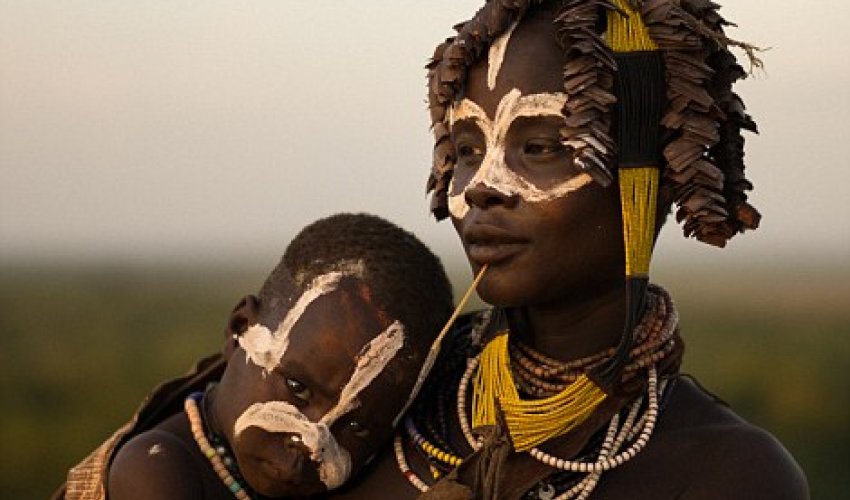Ethiopia's Karo people smother themselves in chalk to find love - PHOTO

Using white chalk and red ochre, the women create intricate circle, spiral and cross-hatched designs in order to look more beautiful and stand out of the crowd.What's more, it's not just the women who use this technique in a bid to be more visually appealing to the opposite sex. The men also paint their faces and bodies to boost their sex appeal.Now the beauty of their painted markings has been revealed in a set of incredible photos by American snapper and economics student Vicente Pamparo, who sought out the tribe, who live on the east banks of Ethiopia's Omo River, to capture the splendour of their tribal make-up.Speaking to MailOnline, he explained: 'The Karo is a highly aesthetic group of people. Their styles are often symbolic of important festivities or as a means of attracting the opposite sex.'Their hair is usually mixed with red ochre and cut in a bowl-like fashion. Walking around the tribe area, you can't help but notice women lathering goat hide with animal fat to add to their wardrobe.'But the tribesmen don't just decorate themselves with white markings to attract women. They also do it for a number of other reasons, including to look more intimating to those from rival tribes in the region and as a means of enhancing their status.Vicente explains: 'The Karo men cover their body and face with white chalk mixed with fat to celebrate important festivities, show off during guest visits, conflict between other clans or for purely aesthetic reasons.'As well as decorating themselves in the white markings, the men will also inflict lacerations and cuts on themselves to produce scars and markings. These are highly esteemed because they represent courageous acts. 'Scarification, whether natural or self-inflicted, symbolises courage or an appeal to the opposite sex,' he added. 'Children will also wear body paint when taking part in festivities and as a means of identifying themselves as part of the clan.'The Karo tribe is made up of about 1,000 people who survive on agriculture and fishing. Their diet consists of maize, sorghum and beans they grow themselves plus they fish from the river and raise goats and cattle.Most of the men carry weapons which Vicente said is necessary to protect their cattle from other tribes and wild animals. But he added: 'It also symbolises their pride, as weapons allows for the protection of not only the individuals but also their tribe.'Despite their intimidating, ghostly appearance thanks to their guns and war paint, Vicente said the tribe were 'pleasant and friendly' when he visited last November to learn about them and their way of life. He said: 'I managed to receive permission to set up a tent within the tribe area and the Karo's hospitality was unwavering. I was invited to drink coffee with several of the families, fished with some of the men, guarded the farms against baboons. I also drank some "akele" which is an alcoholic beverage enjoyed during celebrations. Their token of friendship was remarkable.' (dailymail.co.uk)ANN.Az




































 Photo
Photo 



 Video
Video 

